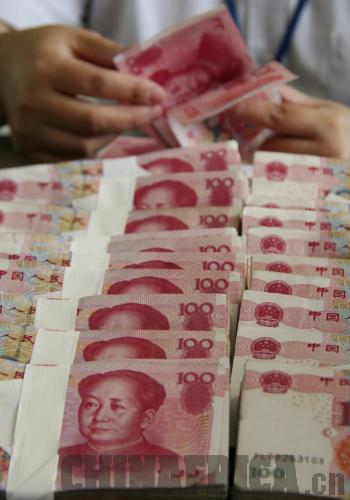| 
Throughout its long history, money matters have always been a major concern for China. The nation that invented paper notes in the 10th century places great emphasis on all things financial.
"Money is of real concern to us Chinese," said Wang Yajie, a 38-year-old financial adviser based in Beijing. "We, as a people, really care about where our currency is heading, and this is evident by seeing everyday people tune into the news to hear about China's financial dealings. Renminbi is more than a currency, it is a fabric of our society," Wang told ChinAfrica.
China's Renminbi (RMB, also known as yuan), which means "the people's currency," was throughout most of its history pegged to the U.S. dollar. However, the currency has now undergone a transformation, with the RMB exchange rate being allowed to float in a narrow margin around a fixed base rate determined with reference to a collection of world currencies.
Along with the government announcing that it will gradually increase the flexibility of the exchange rate, and with several pilot projects being initiated with the aim of internationalizing the RMB, the world is now looking at the RMB as the new global reserve currency, but who will reap the rewards?
Next in line
Claims by experts that the RMB will pip the dollar to the number one slot of international currency ratings has not been made without serious judgment. Its internationalization began to take effect in the last few years, which has seen the Hong Kong's RMB bond market grow at a startling rate.
Even though China ranks second to the United States in terms of economy, China's allowing of foreign banks to be able to hold yuan in 2010 has marked a new watershed for its currency.
According to figures cited by the Dow Jones agency, in 2010, 5.7 percent of foreign trade of China, or 506.3 billion yuan ($80.3 billion), was paid in RMB. The rise of the RMB in international trade is more important than the disruption of its gradual appreciation against the dollar, which is expected to continue at a slow rate of 3 percent to 5 percent per year.
"We predict that in three years, the rules of cross-border trade in yuan represent one third of total Chinese exports and imports, totaling between $1.5 trillion and $2 trillion a year. This development is a major turning point not only for China but also for the regional [Asia] and international market," said economist Qu Hongbin in a recent media interview.
The impact that the international trade of yuan will have on the world has become a hotly debated topic amongst economists, financiers and CEOs alike.
Yum Sui Sang, CEO of Union Commercial Bank of Cambodia, said at a press conference late last year that Western central banks use quantitative easing and government backup plans to deal with fundamental problems in their economies, but it is not sustainable. Those developed countries used to interfere with the development of developing countries. "I believe it is about time for China and ASEAN to unite to protect their own interests. The Chinese yuan is the best choice for an intermediate currency in trade. I hope China could facilitate a trade mechanism by providing yuan convertibility and develop its settlement mechanism which is easy and simple to implement," he said.
|